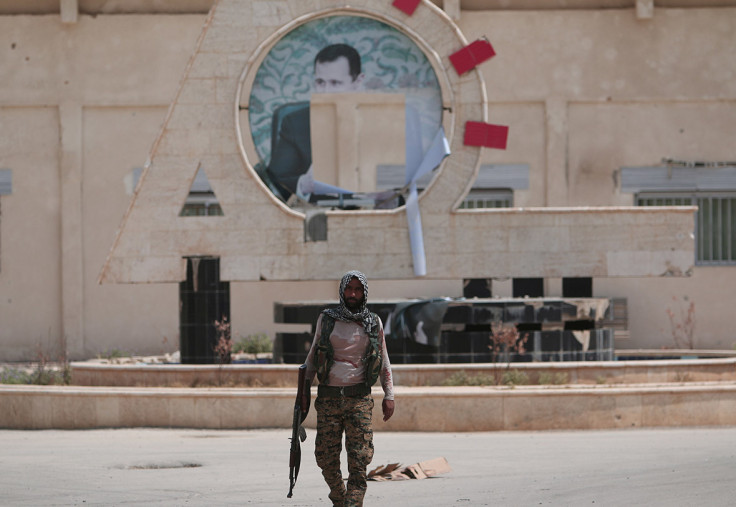In abandoning the Kurds, the US has betrayed its only ally in the war in Syria
America has chosen to placate Turkey rather than back Kurdish anti-Isis forces.
It almost seems like someone took the US strategy, and turned it upside down. Five days ago, US jets were scrambled to protect Kurdish forces in their self-declared Northern Syria Federation from Assad's air force in the eastern city of Hasakah.
Today, in the aftermath of a limited Turkish intervention on Syrian soil, the US is demanding the Kurds leave the northern city of Manbij, which the Kurds fought and died to capture during the past two months – backed by US warplanes.
That these two events happened less than a week from another is astonishing, even in such an unpredictable and volatile environment as the Syrian civil war. That the US is letting down its only remaining ally in Syria, at a time when other powers, namely Russia and Iran, have acted aggressively to protect theirs, is damaging to the overall US position in the region.
This all started with yet another dramatic, seemingly game-changing development that we have become all-but-accustomed to in the Syrian civil war: On 24 August at around 4 am, a patchwork of opposition groups alongside several Turkish tanks and Turkish special forces entered Syria and later captured the ISIS-held city of Jarablus. Less than 24 hours after, by demanding the Kurdish-led Syrian Democratic Force (SDF) leave Manbij, the US took the strategy it itself initiated, nurtured and supported, and dumped it into the trash.

Since the creation of the SDF last November, the US-backed coalition was able to roll back IS advances in northern Syria at an unprecedented pace. An effective mixture of multi-pronged offensives and US air support led to the capture of key IS strongholds, including the city of Shaddadi in eastern Syria, the strategic Tishrin Dam along the Euphrates, and more recently IS's former bastion of Manbij, south of the Turkish border.
The goal of the SDF was to draw the lessons of the now defunct CIA "Train and Equip Program", in the framework of which US weapons were delivered to segments of the opposition deemed to be "moderate", namely the Free Syrian Army (FSA). This programme was a blatant failure: The FSA was and remains united only on paper. It is a mosaic of groups, which despite its numbers lacks a proper chain of command. Significant amounts of US-supplied weapons eventually ended up in the hands of hard line extremist groups such as the now rebranded al-Qaeda-affiliated al-Nusra Front.
Gambling away its only remaining ally in the war-torn country, the US is realigning its strategy with Ankara
The idea of a broad coalition that would include both moderate Arab fighters and Kurdish fighters was born from that failure. The US assessed that the more moderate segments of the opposition needed to be attached to a reliable and battle effective group. It did so at a cost, namely by infuriating President Erdogan who is legitimately concerned by the prospect of having an independent and unified Kurdish entity along its southern border, already bloodied by a Kurdish insurgency. Yet the US seemed to have accepted that cost as Kurdish-led troops, assisted by US advisors, literally crossed Turkey's red line – the Euphrates river – to capture Manbij.
In less than a day, the Turkish intervention in Syria seems to have change the US's "inherent resolve". Gambling away its only remaining ally in the war-torn country, the US is realigning its strategy with Ankara, at a time when the relationship between the two countries has never been worse, and the Turkish ability to successfully shift the dynamic in Syria and face the consequences of its decision never been so questionable.

In the wake of the failed July 15 coup, Turkey's military leadership, particularly senior commanders within the division bordering Syria, are in jail. The country is already facing an intensified campaign of attacks by the Kurdistan Workers' Party (PKK), while the threat of IS attacks has never been so high.
Yet, these concerns have been brushed aside by the Turkish-backed intervention's initial success in Jarablus. While the same opposition groups struggled to capture a small stretch of land in north-western Syria during the past months, they have seemingly turned into a force capable of carrying out lightning offensives against IS.
Or did they? The capture of Jarablus must certainly be applauded as an almost bloodless victory for the FSA and Turkey, but it would be naive to think that IS simply gave up. Despite its aggressive propaganda, IS has shown on many occasions that it was an extremely pragmatic group, capable of weighing the cost of every fight, and withdrawing if necessary.
The initial Turkish success thus unveils a clear IS calculation: IS is calling Turkey's bluff. Rather than serving as a temporary buffer zone between the SDF and the Turkish expedition, it just cleared the way, assessing that the real target of Turkey's intervention are the Kurds. This is a risky bet, yet in light of the contradictions in the US position and the devastating consequence on the relationship between the US and the SDF, the group likely decided it was worth a shot.
Whether violence will indeed erupt between the two rival US-backed forces, the US will have lost the faith and trust of the only partner it has not let down...yet.
Michael Horowitz is a security analyst and head of business development for the Levantine Group.
© Copyright IBTimes 2025. All rights reserved.






















